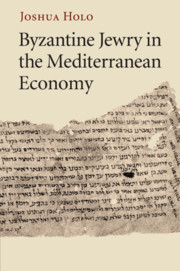Book contents
- Frontmatter
- Contents
- Acknowledgments
- List of abbreviations
- 1 Byzantine-Jewish economic history
- 2 Byzantine Jews throughout the Mediterranean: fluidity and exchange
- 3 The inner economy of the Jewish communities
- 4 The integrated Jewish economy
- 5 Byzantine-Jewish trade in the Commercial Revolution
- 6 Conclusion: a new perspective on Byzantine economic history
- Appendix A MS translations
- Appendix B MS images
- Sources consulted
- Index
3 - The inner economy of the Jewish communities
Published online by Cambridge University Press: 29 March 2010
- Frontmatter
- Contents
- Acknowledgments
- List of abbreviations
- 1 Byzantine-Jewish economic history
- 2 Byzantine Jews throughout the Mediterranean: fluidity and exchange
- 3 The inner economy of the Jewish communities
- 4 The integrated Jewish economy
- 5 Byzantine-Jewish trade in the Commercial Revolution
- 6 Conclusion: a new perspective on Byzantine economic history
- Appendix A MS translations
- Appendix B MS images
- Sources consulted
- Index
Summary
Much of that which defines the communal life of the Jews as Jewish can be described in economic terms. Not only did the tightly knit quality of medieval Jewish communities promote a confluence of overlapping interests and pursuits among its constituents, but more to the point, the very nature of Jewish life blurs, if not belies altogether, the distinction between the religious and the economic. Those mundane functions that, to the majority culture, appear unmarked in relation to religion are, in the Jewish experience, part and parcel of it. The two realms collapse together, because Jews understand the spiritual realm of their religion as one expression of their national existence, which naturally includes economic and social organization within it. Under normal circumstances, the members of a given community required a series of specifically Jewish services and products that met local standards for such disparate concerns as: kosher edibles, capable scholars, scribes and emergency funds for the redemption of captives, to name a few. In order to provide these necessities for uniquely, or almost uniquely, Jewish consumption, communities demanded an entire network based on the proffering of and compensation for these services and goods.
This economy, here dubbed the inner economy, is defined by its inward orientation. It assumes Jewish preparation and production of goods, and training for services, specifically for the benefit of Jews.
- Type
- Chapter
- Information
- Byzantine Jewry in the Mediterranean Economy , pp. 78 - 128Publisher: Cambridge University PressPrint publication year: 2009



